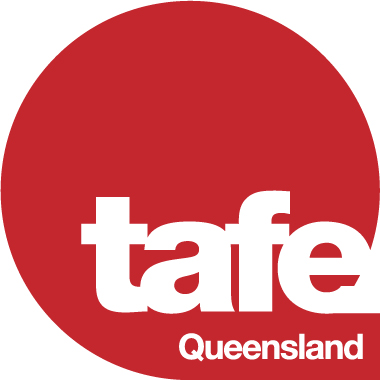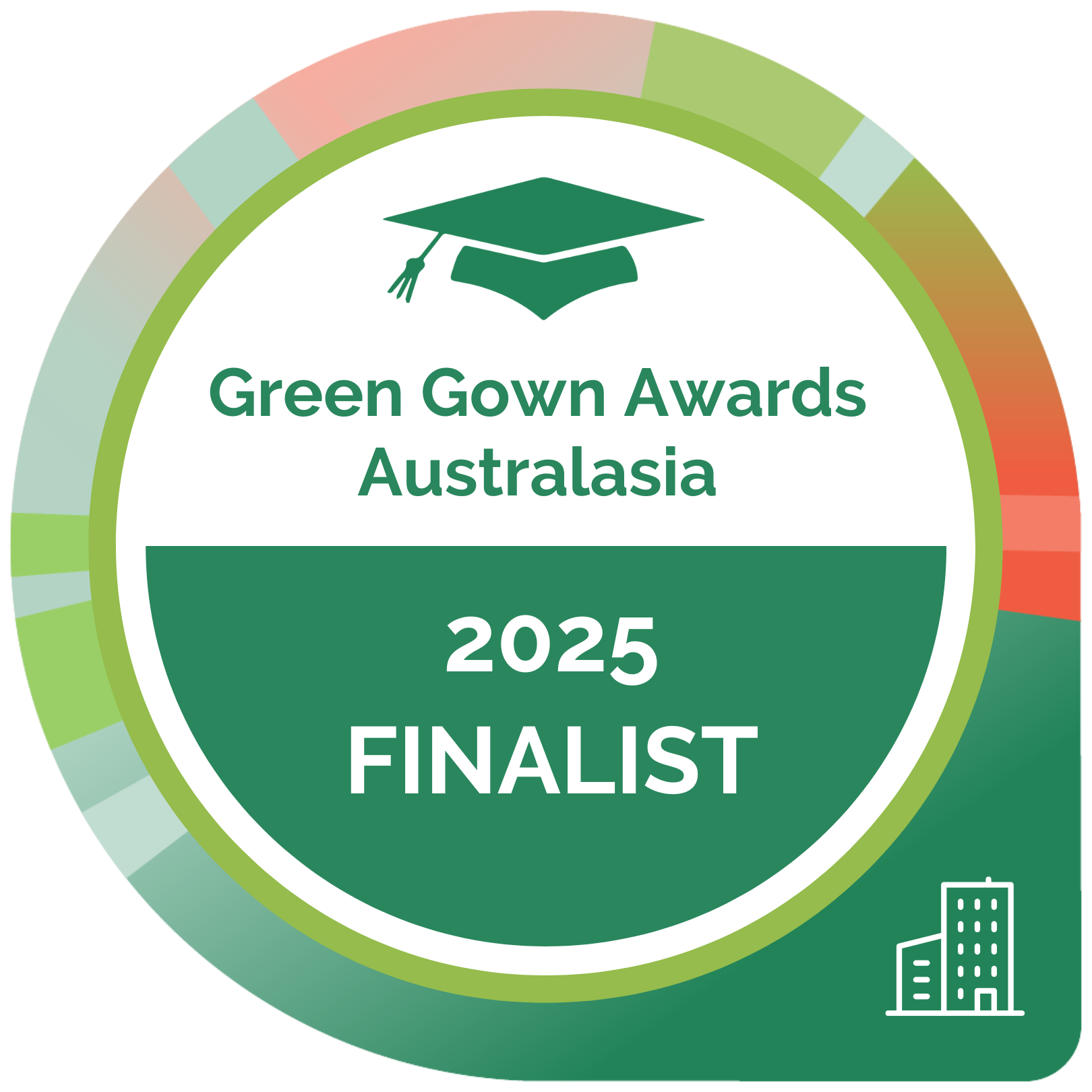Creating Impact category
At TAFE Queensland Robina, a powerful sustainability movement has emerged without a dollar of dedicated funding. What started as student-led reuse tables and container recycling has scaled into a system-wide shift across 64 campuses. The initiative combines creativity, grassroots leadership, and a circular economy mindset to deliver real change. Initiatives such as “Stop and Drop” reuse stations, eco-markets, a cross-campus composting partnership, and the “Be Green, Keep It on Screen” print reduction campaign demonstrate that small, low-cost actions can generate large-scale impact when driven by purpose and people. With thousands of students engaged, measurable waste reductions, and growing adoption across TAFE Queensland, Robina’s model proves that culture change doesn’t require big budgets—just vision and community.

Environmental and Social Benefits
- Diverted 56% of landfill waste in 2023 and achieved a 988% increase in container recycling, with profits used to fund student scholarships.
- Compost produced from food waste at partner campuses enhances horticulture training, while reduced printing has led to widespread savings and environmental benefits.
- Community events like clothes swaps and reuse markets foster social connection, reduce financial pressure for students, and promote conscious consumption.
Leadership and Engagement
- More than 3,000 students and 50+ staff have participated in or led initiatives, spanning hospitality, education, business, fitness, and trades.
- Entirely voluntary and staff-embedded, the program operates without dedicated roles, instead leveraging community energy, peer mentorship, and cross-campus collaboration.
- Robina now mentors other campuses, facilitating the rollout of successful models like “Be Green, Keep It on Screen” across all 64 TAFE Queensland campuses.
Significance to the Sector
- A replicable, low-cost sustainability blueprint for RTOs and VET providers, proving impact is possible with minimal resources.
- Adopted widely across Queensland and featured in Sustainable Business Magazine and sector events.
- Supports the UN SDGs and TAFE Queensland’s Social and Environmental Sustainability Action Plan, while building capacity for sector-wide culture change.
Wider Societal Impact
- Engages local communities and micro-businesses through public-facing reuse and sustainability events.
- Strengthens employability by embedding circular economy literacy and hands-on sustainability practice into student experience.
- Fosters environmental citizenship through peer-led learning, volunteerism, and values-driven leadership.
Top 3 learnings
Supported by

Category finalists
Creating Impact/Winner
Creating Impact/Winner
Creating Impact
Creating Impact
Past winners
Benefitting Society/Winners
Benefitting Society/Winners
Diversity, Equity & Inclusion in Sustainability/Winners
Diversity, Equity & Inclusion in Sustainability/Winners
Climate Action/Winners
Climate Action/Winners
Sustainability Institution of the Year/Winners
Sustainability Institution of the Year/Winners
Creating Impact/Winners
Creating Impact/Winners
Creating Impact/Winners
Creating Impact/Winners
Top 3 learnings
Creating Impact category
At TAFE Queensland Robina, a powerful sustainability movement has emerged without a dollar of dedicated funding. What started as student-led reuse tables and container recycling has scaled into a system-wide shift across 64 campuses. The initiative combines creativity, grassroots leadership, and a circular economy mindset to deliver real change. Initiatives such as “Stop and Drop” reuse stations, eco-markets, a cross-campus composting partnership, and the “Be Green, Keep It on Screen” print reduction campaign demonstrate that small, low-cost actions can generate large-scale impact when driven by purpose and people. With thousands of students engaged, measurable waste reductions, and growing adoption across TAFE Queensland, Robina’s model proves that culture change doesn’t require big budgets—just vision and community.

Environmental and Social Benefits
- Diverted 56% of landfill waste in 2023 and achieved a 988% increase in container recycling, with profits used to fund student scholarships.
- Compost produced from food waste at partner campuses enhances horticulture training, while reduced printing has led to widespread savings and environmental benefits.
- Community events like clothes swaps and reuse markets foster social connection, reduce financial pressure for students, and promote conscious consumption.
Leadership and Engagement
- More than 3,000 students and 50+ staff have participated in or led initiatives, spanning hospitality, education, business, fitness, and trades.
- Entirely voluntary and staff-embedded, the program operates without dedicated roles, instead leveraging community energy, peer mentorship, and cross-campus collaboration.
- Robina now mentors other campuses, facilitating the rollout of successful models like “Be Green, Keep It on Screen” across all 64 TAFE Queensland campuses.
Significance to the Sector
- A replicable, low-cost sustainability blueprint for RTOs and VET providers, proving impact is possible with minimal resources.
- Adopted widely across Queensland and featured in Sustainable Business Magazine and sector events.
- Supports the UN SDGs and TAFE Queensland’s Social and Environmental Sustainability Action Plan, while building capacity for sector-wide culture change.
Wider Societal Impact
- Engages local communities and micro-businesses through public-facing reuse and sustainability events.
- Strengthens employability by embedding circular economy literacy and hands-on sustainability practice into student experience.
- Fosters environmental citizenship through peer-led learning, volunteerism, and values-driven leadership.
Supported by

Related finalists
Creating Impact/Winner
Creating Impact/Winner
Creating Impact
Creating Impact
Other finalists
Climate Action

Driving Towards Tomorrow’s Campus with Vehicle-to-Grid EV Technology
As part of Flinders University’s drive to innovate and become a leader in climate action, the University launched its Vehicle-to-Grid (V2G) initiative. This involved installing and maintaining 20x V2G and smart chargers for its growing electric vehicle fleet. Leveraging 100% renewable energy generated by ENGIE’s Willogoleche Wind Farm and Flinders University’s solar power systems, this enables the storage of renewable energy in EV batteries to be discharged on campus during peak demand periods. Hence, allows for these EV fleets to operate as a Virtual Power Plant (VPP) to deliver peak demand management and optimization of behind-the-meter generation.
Overall, this initiative demonstrates the reliability and scalability of bi-directional and uni-directional smart-charging systems for EVs in reducing GHG emissions while facilitating teaching, research, and innovation opportunities. Moreover, it exemplifies a sustainable and innovative solution to scale energy storage technology and increase renewables.
Sustainability Champion – Staff/Winners

Brandan Espe
Environmental Officer / Acting Grounds Supervisor
Brandan has brought over 50 federally listed Endangered species of plant into the James Cook University living collection, many of which have never been cultivated and are found in no other collection in the world.
Of these, over half have been sustainably wild collected, inclusive of field and clone data, so they can be used for ongoing conservation, research and teaching, the remaining being sourced from private and partner organisations through favours of service or trades.
He personally funded the project from 2019-2022, until funding was awarded for the program due to its success, with the program now being engrained into the Universities landscapes for ongoing management should he leave JCU, creating a threatened species legacy collection.
The program has now expanded beyond this, with an additional 48 species now funded for further addition, some of which are only known from less than 5 sightings in history.
Student Engagement

Sustainability Leaders creating real impact!
La Trobe created a unique Sustainability Leaders volunteering program to increase engagement with students on campus and empower them to act against waste and promote sustainability. It included the following initiatives:
- Promoting the reusable crockery implementation,
- Increasing knowledge action of other students on campus to diversion comingled recycling and organic waste from landfill.
- Focus on waste audits and data,
- Improved signage through new waste posters for students living on campus.
- Collaboration with Cirka (our cleaning and waste partner) to create a waste wall and;
- Learning all things sustainability (net zero, biodiversity, waste, reusables, engagement)
These initiatives yielded significant results and with a reduction in waste contamination by almost 40% at the residential buildings and engagement with over 80 groups of people for the Reusable Revolution.
Creating Impact

Where knowledge meets habits: Empowering students for a sustainable tomorrow
Our online Sustainability Challenges offer participants an engaging, self-paced learning experience centered around a specific United Nations Sustainable Development Goal (UNSDG). Requiring minimal resourcing and at zero-cost to participants, we’ve created replicable, compact, scalable, and impactful learning opportunities that result in real impact.
The Challenges follow a structured process that moves participants from knowledge gain to simple action to celebration, to establish small but mighty habits relating to waste and carbon emissions. This approach recognises that knowledge alone is often insufficient to drive behaviour change, and that ease of action and celebration are crucial components in creating sustainable habits.
Sustainability Champion – Staff/Winners

Catherine (CeeJay) Donovan
Veterinary nurse – Anaesthesia
From establishing the Massey Vet School Green Team to leading impactful initiatives, my commitment to environmental sustainability has been making waves. With the help of my team, I have accomplished numerous small, yet meaningful actions, including integrating a sustainability lecture for final year vet students and implementing battery recycling alongside rechargeable battery use. Our larger projects encompass the introduction of green waste and soft plastics recycling bins, an energy audit resulting in power-saving measures, and playing a part in a successful rubbish audit. I spearheaded the ‘6 in 6’ campaign, empowering individuals with six simple steps for workplace sustainability. Through the SustainaVet social media pages I help to educate and inspire peers nationwide. As the Massey School of Veterinary Science sustainability champion, I had the privilege of speaking at the annual veterinary conference on sustainability in clinical practice. Currently I’m conducting pioneering research on responsible cat waste disposal. Together, we’re forging a greener future, one initiative at a time.
Sustainability Champion – Student

Louis Walmsley
SDG Coordinator Monash Association of Sustainability, Office Bearer Monash Student Association’s Environmental and Social Justice Department, Masters of Environment and Sustainability Student
Louis is an exceptional student sustainability leader at Monash University. His passion and dedication to sustainability have made a significant impact on the community. Louis’s values revolve around sustainability, which is evident upon meeting him. He actively participates in various sustainability groups, demonstrating his commitment to creating a more environmentally conscious society.
One of Louis’s notable involvements is with Precious Plastic Monash, where he organizes remarkable events and fosters collaboration among like-minded individuals, student groups, and staff. His contributions to the Monash Association of Sustainability have allowed him to conduct valuable research on plastic usage and climate action, resulting in positive changes within the university.
Through his work with the Monash Student Association, Louis has engaged hundreds of students in fun and interactive sustainability initiatives. He took the initiative to organize a sustainability food fair, which was one of the largest sustainability-related events held at Monash post-COVID. This accomplishment is a true testament to Louis’s hard work and creativity.
Louis is an outstanding student leader whose efforts in sustainability have had a lasting impact on Monash University and its community. His inspiring nature resonates with everyone who knows him.













